|
|
|
Sort Order |
|
|
|
Items / Page
|
|
|
|
|
|
|
| Srl | Item |
| 1 |
ID:
117769
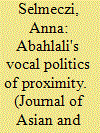

|
|
|
|
|
| Publication |
2012.
|
| Summary/Abstract |
Using as its point of departure the claim that today the urban is the main site for the abandonment of superfluous people, this article explores the emancipatory politics of the South African shack-dwellers' movement, Abahlali baseMjondolo. Based on a notion of political subjectivization as the appropriation of excess freedom, I argue that Abahlali disrupt the order of the 'world-class city' when they expose the contradiction between the democratic inscriptions of equality and the lethal segmentation of the urban order. In articulating their living conditions as the unjustified breach of the promise of 'a better life', the shack-dwellers prove their equality and thus emerge as political subjects. As the article argues, at the centre of this process is a political practice of speaking and listening that is driven by the imperative to reverse the distancing and delaying practices of an order that abandons them by remaining physically, experientially and cognitively proximate to the experiences of life in the shantytown.
|
|
|
|
|
|
|
|
|
|
|
|
|
|
|
|
| 2 |
ID:
117913
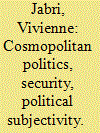

|
|
|
|
|
| Publication |
2012.
|
| Summary/Abstract |
Conventionally, the concept of cosmopolitanism is dealt with as a normative discourse. However, a far more useful understanding is to focus on the practices that the concept enables. The aim in this article is to highlight two manifestations of such practices, namely those that have as their imperative security, the cosmopolitanism of government, and those that might be defined in terms of solidarity, the cosmopolitanism of politics. Both the socio-historical context of the rise of liberal modernity as well as its late-modern manifestations in contemporary security practices suggest that these two articulations of cosmopolitanism should not be seen in oppositional terms, but rather as being mutually implicating and mutually present. While the concept enables a government of populations, containing within it a colonial rationality, the article suggests that there is an excess to the concept that steers it beyond government through security and towards the politics of solidarity. Placing the lens on the forms of political subjectivity generated through cosmopolitan practices, the article highlights the concept's potential in revealing the political implications of contemporary practices that have the postcolonial world as the primary target of their operations.
|
|
|
|
|
|
|
|
|
|
|
|
|
|
|
|
| 3 |
ID:
172136
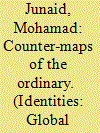

|
|
|
|
|
| Summary/Abstract |
This article examines practices of resistance that thwart Indian state’s control over everyday life in Kashmir. The state frequently uses ‘curfew’ to dominate public space, shut down ordinary mobility, and suppress pro-independence politics. Curfews are enforced through punitive prohibitions and by activating the militarised infrastructure built to reinforce Indian rule over the region since 1947. Yet, Kashmiris are not passive objects of this control. Through overt and hidden practices of resistance and disobedience, like sangbāzi and, what I call, counter-mapping, they keep their aspirations for independence alive, while rebuilding a semblance of everydayness under the occupation. Desire to walk freely becomes the key metaphor for freedom from military control. Based on ethnographic and theoretical material, the article makes a case that in spaces under long-term military occupations political subjectivity is primarily expressed and enacted as a bodily demand to become visible in public space.
|
|
|
|
|
|
|
|
|
|
|
|
|
|
|
|
| 4 |
ID:
158422
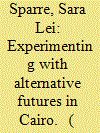

|
|
|
|
|
| Summary/Abstract |
This article investigates young middle-class Egyptians’ engagement with the religious and national visions of Resala, Egypt’s largest Muslim youth NGO, and how they come to rethink themselves existentially and politically through this commitment, in the context of the 2011 uprising and its aftermath. I show how their volunteering through Resala, shaped by specific sociopolitical circumstances, paved the way for personal hopes to develop into utopian aspirations. Demonstrating the dynamic relationship between the formation of political subjectivities and how utopias emerge, develop and are sometimes shattered, I argue that while utopic aspirations continue to characterise parts of Egypt’s 2011 youth generation, for others, such aspirations have to give way for other more personal concerns to establish a secure adult life. Therefore, activism and experiments with societal alternatives in contexts like the Egyptian continue to depend on inclusive and less risky spaces for civic engagement outside formal politics and institutions.
|
|
|
|
|
|
|
|
|
|
|
|
|
|
|
|
| 5 |
ID:
160098
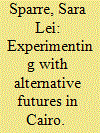

|
|
|
|
|
| Summary/Abstract |
This article investigates young middle-class Egyptians’ engagement with the religious and national visions of Resala, Egypt’s largest Muslim youth NGO, and how they come to rethink themselves existentially and politically through this commitment, in the context of the 2011 uprising and its aftermath. I show how their volunteering through Resala, shaped by specific sociopolitical circumstances, paved the way for personal hopes to develop into utopian aspirations. Demonstrating the dynamic relationship between the formation of political subjectivities and how utopias emerge, develop and are sometimes shattered, I argue that while utopic aspirations continue to characterise parts of Egypt’s 2011 youth generation, for others, such aspirations have to give way for other more personal concerns to establish a secure adult life. Therefore, activism and experiments with societal alternatives in contexts like the Egyptian continue to depend on inclusive and less risky spaces for civic engagement outside formal politics and institutions.
|
|
|
|
|
|
|
|
|
|
|
|
|
|
|
|
| 6 |
ID:
155162
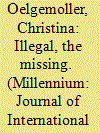

|
|
|
|
|
| Summary/Abstract |
Migration Management, a regime of radical differentiation and exclusion, renders many people illegal because they violate the laws of access across geopolitical borders. Migration Management further disappears some of these illegal people outside of the external boundaries of the Global North. Recently, however, discursive moves to mobilise the concept of the ‘missing person’ in the context of illegal migration have been introduced when discussing Mediterranean migration in particular. This article offers an ethico-political evaluation of such conceptual innovations. The article asks if a reconceptualisation of the illegal migrant as ‘missing person’ is able to destabilise Migration Management and concludes that this is unlikely. The article illustrates how this reconceptualisation cements the more radical practices of exclusion whilst the boundary-drawing is reformulated as one between dead and living migrants.
|
|
|
|
|
|
|
|
|
|
|
|
|
|
|
|
| 7 |
ID:
095916
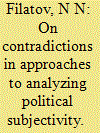

|
|
|
| 8 |
ID:
157735
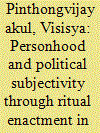

|
|
|
|
|
| Summary/Abstract |
This article examines the relationship between an important local spirit cult and the construction of Isan political identity in Chaiyaphum province, northeast Thailand. Isan subjectivity has largely been studied through social or political-economic lenses. This study looks, however, at the spiritual experiences and ritual performances that crucially manufacture a local version of personhood. The spectacular annual performance of social memory and historical commemoration of Phaya Lae is constitutive of political identity for the people of Chaiyaphum province. I argue that the rituals surrounding the Phaya Lae cult enable the people of Chaiyaphum to perceive their subjectivity as Thais via the integration of the deity into the historical imagination of the state. I argue further that such local performances of spirit cults sustain Thailand as a ‘ritual state’ in which power and prestige are maintained by ritual enactments both in everyday life and ceremonial events. Through mediumship, the periphery draws charisma from the central Thai state and in turn ritually sustains the potency of the centre.
|
|
|
|
|
|
|
|
|
|
|
|
|
|
|
|
| 9 |
ID:
190768
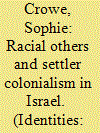

|
|
|
|
|
| Summary/Abstract |
From 2006, thousands of migrants crossed into Israel after travelling through the Sinai Desert. The majority came from Eritrea and Sudan, seeking asylum from state violence. Israel’s government classified them as ‘infiltrators’ using a law enacted in 1954 to criminalize Palestinians seeking to return to expropriated lands. Drawing on fieldwork in Israel in 2018–2019, the article examines dimensions of a process of political subjectivation among these migrants and citizens in solidarity with them. It is concerned with the performative effects of a struggle migrants waged for refugee status by contesting their construction in government discourse as infiltrators. It argues their claims became refracted through debates over contours of a fissured collective self, which challenged the limits of political community. While their claims disrupted the order’s dividing lines, the article argues the latter proved durable, that conditions of possibility for disruptive speech are mediated by overlapping structures of colonialism and racializations.
|
|
|
|
|
|
|
|
|
|
|
|
|
|
|
|
| 10 |
ID:
100909
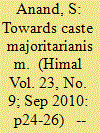

|
|
|
| 11 |
ID:
117772


|
|
|
|
|
| Publication |
2012.
|
| Summary/Abstract |
If, as Spinoza suggests, sadness is an inadequate idea, how do we account for its mobilization in nationalist and post-colonial critiques of colonialism, neo-colonialism and neo-liberalism? How, in other words, might we see in the inadequate idea of sadness the very conditions for thinking our way into a discussion of political subjectivity that loosens the grip of biopolitics on African subjectivity? Drawing on aesthetic practices of art and film, this article argues that a fundamental shift is discernable in the careful ways in which the affect of sadness has been worked over by artists and filmmakers in Africa. This is a site of productive reworking, which not only eclipses the exhausted political sphere in Africa, but offers ways to theorize its reconstitution. To this end, the article asks that we attend to the ways in which potentiality and impotentiality are rendered as central premises for tackling the question of the renewal of political subjectivity in Africa.
|
|
|
|
|
|
|
|
|
|
|
|
|
|
|
|
|
|
|
|
|